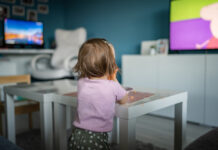In this piece for The Guardian, Alex Beard compares robot learning to language acquisition and development in children. While robot learning is abstract and formulaic, learning in children is a fundamentally social and interactive process that cannot be accomplished without guidance from and connection with other humans.
“Schools are still guilty of ignoring these insights into infant learning. Erika Christakis, early-childhood expert and author of The Importance of Being Little, charts the slow descent in preschool learning from a multidimensional, ideas-based approach to a two-dimensional naming-and-labelling curriculum. Daphna Bassok at the University of Virginia asks if kindergarten is really the new first grade. The expectation that kindergarteners – aged five or six – can read is now commonplace. Yet this is counter to all the evidence. A Cambridge study comparing groups of children who started formal literacy lessons at five and seven found that starting two years earlier made no difference at all to a child’s reading ability aged 11, ‘but the children who started at five developed less-positive attitudes to reading, and showed poorer text comprehension than those who started later.’
These findings are clear: if you start on the decoding before you have an underlying understanding of story, experience, sensation and emotion, then you become a worse reader. And you like it less. Treat kids like robots during early learning and you put them off for life.”















